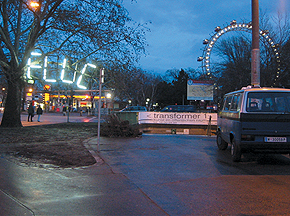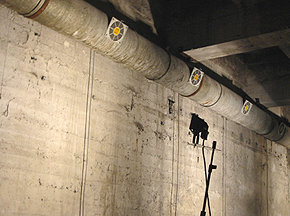The FLUC is a project space at
the Praterstern, which was opened by the artists Martin Wagner,
Joachim Bock and Alexander DeGoederen and – extended
by the Fluc_Mensa, a space for concerts and exhibitions – soon
became a well known location for events and at the same time
one of the most popular clubs for electronic music.
With the exhibition transformer 1 in the framework of fluc
im exil 05 another location, the old pedestrian passage at
the Vienna Praterstern, was introduced to a larger audience
as an exhibition space for works of contemporary art. On
the occasion of this exhibition the old building fabric of
the
passage was presented one last time before– adapted,
renovated and transformed – it served as the frame for
the new development of the Fluc and the Fluc_Wanne.
One section of the art works reflects the transformation
of this specific space from its public traffic function to
a mix
of construction site and exhibition space. In the functional
and communication-oriented space of urban sign systems the
work titled “Bautafeltafelbild“ by Christian Bauer
and Klaus Stattmann – if one reads it as a caveman painting – seems
like an ironic and at the same time paradoxical comment on
the pedestrian passage which had once again turned into a cave.
Other works refer to the inside of the spaces which, especially
in times of structural transformation becomes visible outside.
The space and sound installation oscillator-ventilator or tat
ort, who discover the hidden spatiality of a ventilation pipe
in the form of an audio sculpture or make the interspace disappear
with uncanny combinations of pipes and teddy bears, fall into
line with this.
|
 |
The ventilation pipe once belonged to the public lavatory
whose existence and performativity was commemorated by Carola
Dertnig’s text installation prater_cloh. The video
section of transformer 1 offered a review of artistic strategies
of resistance against fixed models and representations of
the female over the past thirty years thus documenting the
transformation of the performative identity of gender as
such. The works by, among others, Valie Export, Sanja Ivekovic
or Renée Green followed this rethinking of one’s
own corporeality into the direction of narrative self analysis
and opened the hitherto valid interfaces between the private
and the public space.
Moreover, the video works of Goldsmith College graduates
were shown in the framework of fluc im exil 05. They were
projected on the outer wall of the Planetarium
in the Viennese Prater. The videos reflected on the social and cultural consequences
of the increased image production in the public space due to the plethora of
tourist cameras and police surveillance. Whereas one project visualizes the
surveillance pressure that is brought to bear on the pedestrians’ behavior, there is
no visible observer anymore in Jutta Strohmayr’s satellite pictures. The
artist enhances the virtual character of these pictures by cutting out parts
of the pictures and superimposing the pictures upon one another.
Last but not least, Esther Stocker’s installation, which was presented
in the frame of add on – 20 meters altitude, also belongs to fluc im exil
05. bk
transl. ol |





